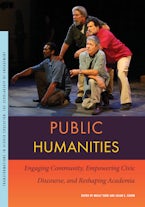“Many people labor under the misapprehension that humanistic work is limited to quiet study and reflection. This volume spotlights the humanities in robust action in all sorts of places: parks, gardens, prisons, rodeos, museums, grammar-school classrooms, and community council meetings. It gives voice to professors, miners, farmers, activists, and many other co-creators of historical and cultural understandings. The projects described here are local and small in scale, but their commitment to political and social change through told truths show that the humanities is a plural, world-broadening, world-improving enterprise.” — Joy Connolly, scholar of ancient Roman thought, and president of the American Council of Learned Societies
“Public Humanities plays a critical role in advancing the stature of public humanities work. While traditional humanities scholarship applies established disciplinary methods to the creation of knowledge, public humanities work invites improvisation. The authors in this welcome volume reflect on their efforts to co-create humanities projects with a variety of community partners. Each requires radical empathy and intellectual flexibility to facilitate the creation of new processes, the adoption of multiple methodologies, and the articulation of shared principles. The authors analyze both successes and failures, allowing readers an inside view of precisely what we mean when we describe public humanities work as a profoundly collaborative intellectual endeavor with the potential to elevate the human experience and advance social justice.” — Denise D. Meringolo, professor and chair, Department of History, University of Maryland, Baltimore County, and president of the National Council on Public History

